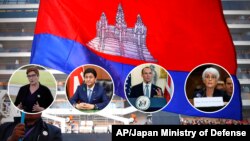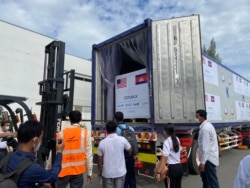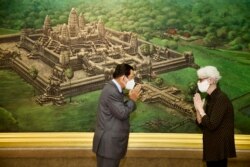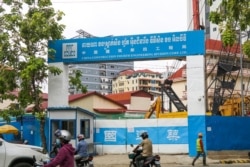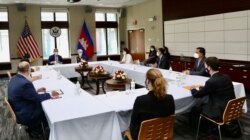U.S. Deputy Secretary of State Wendy Sherman arrived in Phnom Penh on June 1, with the alleged presence of Chinese military personnel at Ream Naval Base at the top of the agenda – a contentious issue that put the bilateral relationship in question.
In the weeks following Sherman’s visit, other senior diplomats, all allies of the U.S., have made visits, some virtual, to Cambodia and talked trade, the COVID-19 pandemic, climate change and Cambodia’s turn to chair ASEAN in 2022.
U.K. Foreign Secretary Dominic Raab landed in Phnom Penh on June 23. Japan’s Defense Minister Nobuo Kishi held online talks with his Cambodian counterpart Tea Banh on June 25. Most recently, Australia’s Foreign Minister Marise Payne had a phone call with Cambodia’s top diplomat Prak Sokhonn on July 7.
The increased engagement is also evidenced in a slew of vaccine donations from the U.S., U.K. and Japan. The three have pledged or delivered 1 million, 415,000 and 1 million vaccines, respectively, to add a stable inflow of Chinese-made Sinovac and Sinopharm vaccines which have made possible Cambodia’s high rates of vaccination. Cambodian officials said last week that Australia too hadpromised to provide an unspecified number of vaccines.
“It is not a coincidence,” said Em Sovannara, a Cambodian political commentator.
Sovannara and other observers said the U.S. and its allies were making a concerted effort to engage with Cambodia, which has grown closer to China – on account of the latter’s investment and trading capacity. Another reason, they said, was Cambodia’s chairing of ASEAN next year.
“They are engaging in part to ensure Cambodia’s more neutral stance as [ASEAN] chair rather than letting Cambodia take a China-leaning stance like our last chairmanship in 2012, which would be too late,” he said.
Informally called the “Phnom Penh Fiasco,” ASEAN failed to issue a joint communique at the end of the 2012 summit in the Cambodian capital. The unprecedented event was attributed by participants and observers to Cambodia’s reluctance to include language critical of China’s activities in the South China Sea.
“Thus, these visits and calls by Western allies to engage Cambodia is to make sure that the latter’s foreign policy directions would be balanced and acceptable by the West,” Sovannara said.
Derek Grossman, a senior defense analyst at the U.S.-based think tank RAND Corporation, said the recent meetings were likely held to understand Phnom Penh’s positions going into 2022.
“It's very much a critical year [2022] because you have so much going on in the region. I mean, obviously China, and the long-delayed conclusion of a Code of Conduct for the South China Sea,” he added.
“I'm under no illusion. I don't think it [the Code of Conduct] is going to be concluded next year, anything like that, but at least to see it moving forward under Cambodia's chairmanship, I think, is an important thing.”
Grossman is referring to the 1996-proposed ASEAN code of conduct for the contentious waters of the South China Sea, after China laid claim to the Mischief Reef, off the Philippines coast. Twenty-five years on, the code of conduct is yet to see the light of day.
Grossman said the post-coup violence and crisis in Myanmar would remain as ASEAN’s “complete disaster,” and it was unlikely that Cambodia, “as a fellow authoritarian state,” would chastise the Tatmadaw.
During a July 7 phone call with his Australian counterpart, Cambodian Foreign Minister Prak Sokhonn expressed his government’s “readiness” to work with fellow ASEAN member states and partners "to support Myanmar's return to the path of normalcy and democratic transition", according to a Cambodian Foreign Ministry’s post-call readout.
But during a special ASEAN-U.S. Foreign Ministers’ Meeting held on July 14 with U.S. Secretary of State Antony Blinken, Prak Sokhonn “underscored the principle of non-interference,” the Foreign Ministry said, a phrase often cited by Cambodia to deflect criticism of local human rights violations.
“On the South China Sea, [Prak Sokhonn] encouraged all parties concerned to exercise maximum restraint to avoid further escalating the situation and to seek a peaceful solution to disputes in accordance with the international law, including the 1982 UNCLOS,” a Foreign Ministry document from the meeting reads.
The U.S. has repeatedly raised concerns over Chinese-backed coastal development in Koh Kong province - for which Chinese-linked developer UDG was sanctioned last year – and assistance to modernize Cambodia’s Ream Naval Base in Preah Sihanouk. Speculation that there will be a permanent Chinese military presence at the base has been denied by Cambodia.
Grossman said Cambodia was leaning heavily on China and that the latter had increasing influence within the country.
“But then there is also a notion that Cambodia, at some point in the future, may begin playing and bringing these countries [western allies] into the fold and kind of playing them off China,” he said.
The Joe Biden Administration, with its “America is Back” foreign policy outreach, is working hard to court like-minded allies to pursue human rights and democratic agendas in the region and the Asia Pacific.
Four out of nine ASEAN member states – excluding Brunei -- are authoritarian, according to the latest global democracy index released in February by the Economist Intelligence Unit. Six of the eight heads of ASEAN governments – excluding Brunei and Laos – are enlisted in the press “predators gallery” by the Reporters Without Borders. Cambodia features in both lists.
Phil Robertson, deputy Asia director for U.S.-based rights group Human Rights Watch, said he didn’t believe the U.S. and its allies would compromise its strategic interests to counter China’s influence in the country.
“The idea that somehow a few prominent visitors going to Cambodia means that human rights issues are off the table, I think, is that you cannot draw that conclusion,” Robertson told VOA Khmer in a phone call interview.
“I think Cambodia will continue to face even more pressure on human rights as the 30th anniversary of the Paris Peace Accords comes up in October this year.”
Robertson doubted whether Cambodia would be successful in playing the U.S., and its allies, against China.
During her meeting with Hun Sen, U.S. Deputy Secretary of State Sherman also urged the prime minister to uphold an “independent and balanced foreign policy in the best interests of Cambodian people”.
Phay Siphan, a Cambodian government spokesperson, said Cambodia had taken note of the “united front to counter China” formed at the June G7 summit in England.
“And we are now observing Western-allied nations rushing to engage Cambodia to propose and raise their agendas when Cambodia is taking a turn to chair ASEAN. This is not bad for Cambodia that they value our roles as the future chair of ASEAN,” Siphan told VOA Khmer.
“On the South China Sea, it is not a conflict that Cambodia is engulfed in, Cambodia is not the core of the conflict, and Cambodia is not a decider for final resolution of the conflict. But Cambodia is only an actor to give the platform for dialogue.”




